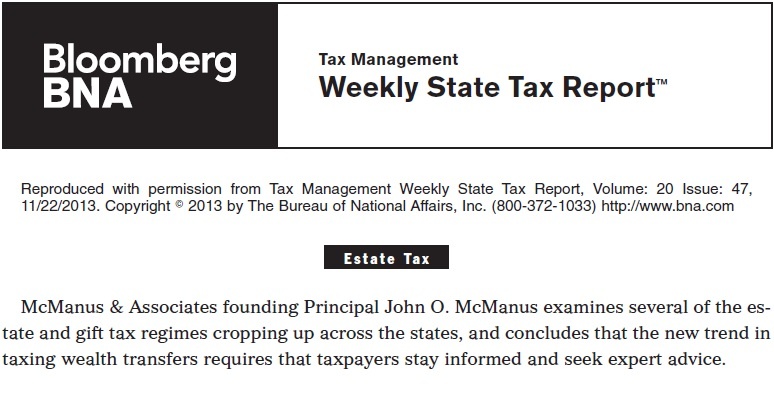 By John O. McManus
By John O. McManus
For decades, an array of ‘‘death taxes’’ has become
part of the cost of living and dying in the United
States. With demands to balance budgets, minimize
debt, and support public programs, states are exploring
strategies to create new revenue by expanding
the footprint of taxation. To foster an increased flow of
cash to their governments, even states with generally
conservative fiscal policies have recently taken steps
that may indicate a new trend in the taxation of wealth
transfers, both during their taxpayers’ lifetimes and after
their deaths.
Connecticut Takes the Lead
In 2005, Connecticut was the first state to impose a
state gift tax on lifetime gifts made to others. In the
years following the adoption of this statute, the gift tax
exemption (or the amount that a Connecticut resident
could gift during his or her lifetime without paying gift
tax) gradually increased and rose as high as $3.5 million.
However, beginning in 2011, Connecticut’s governor
signed into law a new budget that dramatically curtailed
the ability to make tax-free gifts by reducing the
state’s lifetime gift exemption to $2 million and taxing up to 12 percent on aggregate lifetime gifts exceeding
that amount.
Furthermore, effective as of July 1, 2013, in addition
to adopting rules subjecting certain non-residents to estate
taxation, Minnesota passed a law that established
its own state gift tax with a gifting exemption that is
limited to $1 million.
It is a significant concern that other cash-strapped
states may follow the lead of Connecticut and Minnesota.
Those states that do charge an estate or inheritance
tax experience diminishing returns when the
property and assets that their residents gift during their
lifetimes are not a part of the estate upon death. Furthermore,
many politicians view the imposition of a gift
tax as a safer revenue-generating innovation, because
most of their constituents would be unaffected by such
a levy.
More than ever, these developments highlight the existing
challenges, including estate tax, inheritance tax,
generation-skipping tax, and other traps, in transferring
an estate to loved ones, while also signaling the
alarm that, in the near future, it may become even more
difficult to make such a transfer in a tax-efficient manner.
New Gift Tax: Minnesota, a Case Study
Earlier this year, the Minnesota legislature passed a
bill that imposes a 10 percent state gift tax on lifetime
transfers of wealth exceeding $1 million, the state exclusion
amount.
The tax is applied to the value of all assets transferred
by a Minnesota resident (and, for a non-resident, gifted real property located in Minnesota), and the donor
would be required to pay the gift tax due. The Minnesota
Department of Revenue has yet to release the
Minnesota gift tax form, but timely filing of this document
will be necessary, together with the gift tax return
at the Federal level (Form 709).
Additionally, Minnesota has placed further constraints
on gifting by rendering all ‘‘deathbed gifts’’
made within three years prior to the donor’s passing
null and void. This would have the effect of clawing assets
gifted within that period of time back into the donor’s
estate and subjecting them to estate tax.
Finally, in this new law, the State of Minnesota
makes an effort to swell its tax base by requiring that
non-residents owning real property in Minnesota pay
estate tax on the value of such property after they pass
away. This tax even applies to real property owned in
a Limited Liability Company or Revocable Living Trust,
which would otherwise be common approaches to
avoiding this exposure.
Non-residents owning real property
in Minnesota pay estate tax.
Relatively speaking, knowing that Minnesota’s legislature
acted on the heels of Connecticut’s reduction in
its own gift exemption, it is not unreasonable to believe
that other states may follow suit in the coming months
and years. As such, it will be important to monitor similar
developments in the governments of other states to
determine whether the climate will ultimately become
less hospitable for gifting and more confiscatory in
terms of estate taxes. Those who reside in a state with
an estate tax on the books may also benefit from acting
sooner rather than later by making gifts and other
wealth transfers to take advantage of the lack of current
restrictions and limitations and before any new law is
implemented.
Death Taxes: New Jersey, a Case Study
Gift tax, state inheritance and estate tax, Federal estate
tax, and generation-skipping tax complete a group
commonly referred to as ‘‘death taxes.’’ To a lesser extent,
income tax is also considered when planning for a
transfer of wealth.
New Jersey and Maryland are the only two states
that maintain a dual, sometimes overlapping death tax
for residents and non-residents at the time of death. In
New Jersey, estate tax is imposed when gross estate assets
are greater than the exemption amount—currently
$675,000—and assets transfer to ‘‘Class A’’ beneficiaries,
which include parents, grandparents, spouses, civil
union partners, children, step-children, or more remote
descendants of the deceased. The New Jersey estate
tax, which is paid from estate assets before transfer to
estate beneficiaries, is a graduated tax with a rate as
high as 37 percent and as low as 4.8 percent. The rate is highest for the first $50,000 over the exemption amount
and generally averages 10 percent thereafter.
When assets having a cumulative value greater than
$25,000 pass to ‘‘Class C’’ beneficiaries, including siblings
and children-in-law, a New Jersey inheritance tax
is imposed. The ceiling plummets to $500 for all others,
known as ‘‘Class D’’ beneficiaries (for example,
nieces and nephews, cousins, or friends of the deceased
who receive assets after death). The New Jersey inheritance
tax, which is paid by each beneficiary who
falls in either of these classes, carries with it a rate that
ranges from 11 percent to 16 percent.
The interplay of these two New Jersey taxing regimes
can be illustrated by way of example using an estate
with gross assets of $ 1 million. Assume 90 percent
of the estate ($ 900,000) has been bequeathed to a Class
A beneficiary—decedent’s son, and 10 percent
($100,000) has been bequeathed to the decedent’s
brother, a Class C beneficiary. The inheritance tax is determined
first, and is imposed on the $100,000 bequeathed
to the Class C beneficiary, after subtracting
the $25,000 exemption amount. The remaining $75,000
is subject to an 11 percent inheritance tax of $8,250,
which is paid by the Class C beneficiary.
With gross assets of the estate equalling $1 million,
estate tax is imposed on that part of the $ 1 million estate
that exceeds the $675,000 exemption amount. The
exemption amount is in effect taken into account as
part of the allowable unified credit linked to the estate’s
federal estate tax return. The New Jersey estate tax imposed
on the remaining amount computes to $24,950,
after a dollar-for-dollar credit is given for the inheritance
tax. In this example, the estate tax accounts for
2.5 percent of the entire estate.
For New Jersey residents, all real property in state,
as well as tangible and intangible assets located in or
out of state, are included in the calculation of taxable
estate assets. Like in Minnesota, non-residents are
taxed on real property located in New Jersey, but with
the distinction that if such real property is owned by a
Limited Liability Company prior to death, it is recharacterized
as intangible personal property and tax is
avoided.
The nuance and variation in the taxation structure
also carries through to permissible exemptions and deductions.
For example, annuities and life insurance proceeds
with a designated beneficiary are not taxable for
inheritance tax purposes, but are included in the estate
for the purpose of calculating estate tax. Funeral expenses,
administration expenses, and debts of a decedent
may be used as deductions to reduce both estate
and inheritance tax, but real estate and property maintenance
costs may not be used as deductions in most instances. It is important to note that New Jersey estate tax is
due within nine months of the decedent’s date of death
and must be accompanied by a Federal Form 706 Estate
Tax Return (unless an alternate New Jersey form is submitted),
while inheritance tax is due within eight
months of the decedent’s date of death. For each structure
of taxation, a six-month extension to file the return
is available, but there is no extension with respect to the
payment of the tax, and penalties and interest are accrued
on any late or underpayment of taxes.
The decedent’s lifetime gifts also receive different
treatment for New Jersey estate and inheritance tax
purposes. The full amount of lifetime gifts made within
three years of death are considered in contemplation of
death and are pulled back into gross estate assets for
the purpose of calculating inheritance tax. Conversely,
all lifetime gifts are included on the estate tax return
submitted to New Jersey, no matter when they were
made and for whatever purpose.
The complex nature of death taxation in the Garden
State is exemplary of the estate planning difficulties
confronting taxpayers throughout the New York Metropolitan
area and elsewhere in the United States. New
York and Connecticut both impose estate taxes, and
they limit their estate tax exemptions to $1 million and
$2 million, respectively. Pennsylvania requires an inheritance
tax on assets received by any person other
than a spouse. Unfavorable statutes of this nature in the
tri-state area have very much contributed to the flight of
residents to the 30 states, such as Florida, that lack a
death tax regime.
The Importance of Domicile
Proving domicile in a state to which one has moved
is oftentimes a difficult process in and of itself, particularly
for those who wish to maintain a foothold in the
state from which they are transferring their residences.
Meticulous records must be kept to demonstrate that
the requisite number of days is spent in the new jurisdiction
to claim residency there. This is particularly vital
because New York, New Jersey, and Connecticut are
increasingly auditing the files of ‘‘snowbirds’’ who
change their residency. The argument is that those
people really never left by virtue of the fact that they
continue to spend a substantial amount of time in their
former home states. As such, there is a laundry list of
items that expatriates are advised to complete, such as
changing their voter registration, driver’s license, and
address of record to their new state; maintaining landline
telephone records, receipts, and other statements
that prove their physical location in their new state; and
purchasing and owning a home, rather than renting, in
their new state of domicile.
Probate and estate tax issues linger when taxpayers
continue to own property in their previous state of residency.
Moving to a new state will not necessarily completely
eradicate estate exposure from the previous
state if an individual continues to own real property
there. Additionally, direct ownership of real property in a state other than the state of domicile will necessitate
an ancillary probate proceeding in that jurisdiction.
Probate is one of the initial stages during the administration
of the estate, and going through probate in multiple
states dramatically increases the time, expense,
and frustration of this process. Typically, the best approach
to remedy these issues is to transfer the real
property to a Revocable Living Trust, which avoids probate
proceedings, or a Limited Liability Company,
which is treated as intangible personal property and,
therefore, avoids both probate and estate tax in the
state where the property is located.
With respect to other forms of intangible personal
property, such as securities or bank accounts, the general
rule established by case law is that these types of
assets follow the person and that—for the purposes of
estate taxation—the domicile of the owner has jurisdiction
via a provision with a fancy name: ‘‘Mobila sequunter
personam.’’ That said, it is also well-settled that
a state legislature may impose local tax on items of personal
property that are significantly distant from that of
the owner’s permanent residence. In rare cases when a
physical stock certificate is owned, the physical location
of the document determines the jurisdiction that governs
for tax purposes. Such securities can be owned by
a revocable living trust, and the situs of the trust will be
the tax regime that rules taxation of the portfolio. The consequences of failing to comprehensively prepare
for the threat of death taxes underscore the value
of consulting with expert advisors to ensure awareness
of prospective taxation and other post-mortem pitfalls,
and to ensure success in implementing strategies that
will importantly aid in reducing or eliminating these
problems.
Generation-Skipping Transfer (GST) Tax
While 20 states and the District of Columbia subject
residents to estate and inheritance taxes (and while
there is also a federal estate tax), GST tax at the Federal
level is an issue that gets much less attention because
its provisions are considered to be among the
most complicated in the Internal Revenue Code. GST
tax is generally levied on the value of property received
by descendants more than one generation down the line
(such as grandchildren), which exceed the GST tax exemption
(currently $5.25 million and rising to $5.34 million in 2014). For individuals and families who have undertaken
material estate planning with trusts in the past
(and for those who will do so in the future), this becomes
a thorny matter as a result of the automatic allocation
rules that went into effect in 2001 that apply to
any trust that is deemed to be a ‘‘skip trust’’.
For example, a popular estate planning technique is
an Irrevocable Life Insurance Trust (ILIT) to which a
life insurance policy is transferred in order to avoid estate
tax on the proceeds of the policy at death. Generally,
these types of trusts are appealing because no gifting
exemption is used and no filing with the IRS is required.
The risk, however, is that depending upon the
provisions of the ILIT, the IRS may classify it as a skip
trust, which would then create unintended consequences
that impact other aspects of the estate plan.
Any amounts contributed to the ILIT would automatically
exhaust a portion of the donor’s GST tax exemption
that the donor may have otherwise wanted to preserve
for future lifetime or death wealth transfers to
grandchildren and more remote descendants.
The result is that the unnecessary GST taxes, which
could have been minimized or eliminated entirely, may
be imposed at the time that the grandchildren inherit
their share. The best practice, therefore, is to file gift tax
returns whenever an ILIT or irrevocable trust is funded
in order to clarify whether the automatic allocation
rules apply depending on the structure, provisions, and
long-term planning goals for the trust.
The GST tax and the proper deployment of the GST
tax exemption are no longer issues that can be brushed
aside or ignored. In 2011 and 2012 following the dramatic
escalation of the federal lifetime gifting exemption,
the affluent made an unprecedented number of
gifts to irrevocable trusts – tens of thousands of individuals
and married couples made gifts ranging in value
from hundreds of thousands of dollars to $10 million,
with the expectation that such trusts would carry forward
through several generations. This significant issue
is not only relevant to gifts made into trusts in the past
two years, but it also warrants further examination of
any trust established after 2001 to best ensure that the
wealth transfer plan operates as intended.
Stay State Informed
Choosing where to live is about more than good food
and the weather. It can have a huge impact on the
money on hand today and the amount of wealth that
can be transferred to heirs tomorrow. Different states
have significantly different tax regimes, so moving
across the country or just across the state line could
also mean that one’s estate planning approach needs to
be revised. All in all, the best strategy for preserving the
greatest amount of assets is to stay informed.
 To understand what is often at the heart of inheritance wars – the “mysterious life insurance policy” – Reporter Ed Leefeldt turned to John O. McManus, McManus & Associates’ founding principal and top AV-rated attorney, for help. As recognized by McManus:
To understand what is often at the heart of inheritance wars – the “mysterious life insurance policy” – Reporter Ed Leefeldt turned to John O. McManus, McManus & Associates’ founding principal and top AV-rated attorney, for help. As recognized by McManus:






 ⟩
⟩ ⟩
⟩ ⟩
⟩ ⟩
⟩ ⟩
⟩ ⟩
⟩